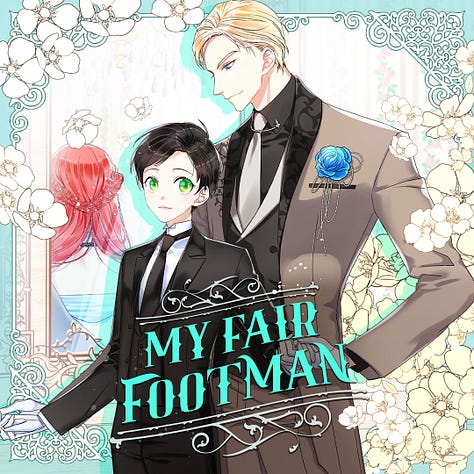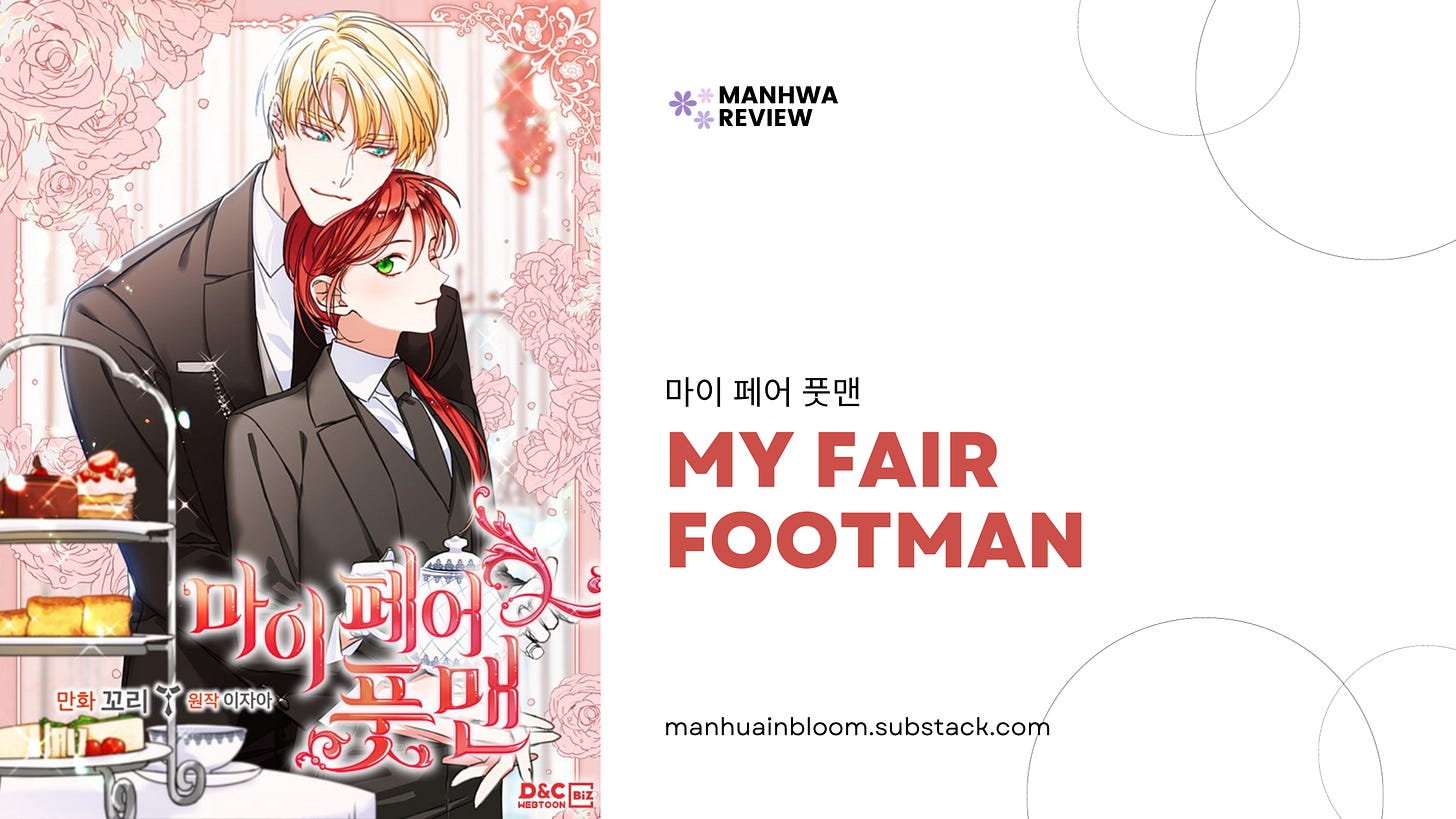Korean Title: 마이 페어 풋맨
Genre: Romance Fantasy
Story (Original Novel) By: 이자아 (Lee Jaa)
Art By: 꼬리 (ggory)
Official English Translation: Tappytoon, Tapas
Original Manhwa: KakaoPage
Original Novel: KakaoPage
Images via KakaoPage, Tapas
Avery (Elijah) has a secret, one that she’s kept ever since she was a child. After the Countess of the noble Baenbowie House falls ill from the shock of her second son’s death, her mental health severely deteriorates and she even ends up mistaking young Avery as her deceased child. With no hope for her recovery, the earl approaches Avery’s mother, who worked as a maid for the family, and makes a deal with her—raise Avery as a boy until she’s 18 to delude the countess that her youngest son is still alive, and they’ll be able to live the rest of their lives in comfort under the earl’s care.
With this, Avery is forced to dress up as a boy and also becomes a childhood friend of the earl’s first son Albert. Even though men are given more opportunities than women in this historical setting, Avery wants nothing more than to live her life as a girl and eagerly awaits the day she turns 18 when the contract finally comes to an end.
As the years pass, Avery takes on the job of a footman for the Baenbowie House, following the contract even after her mother passes away. And Albert also goes on to succeed his father as the current Earl of Baenbowie.
While Avery continues to count down to her 18th birthday, she finds herself developing feelings for her old playmate and unknowingly comes across hints of her concealed family background that could potentially change her entire identity.
The world around me demanded that I become a boy. Before I had even developed a sense of self, I was dressed and raised as a boy. I was told I needed to play this charade by putting up a facade. But as I grew, the facade became harder and harder to maintain. And the burden of anxiety and fear from this demand was made mine alone to bear.
Note: The following review contains spoilers.
Although gender bender tales certainly aren't unique as the market becomes more saturated, the setup in My Fair Footman does subvert a few expectations that help make the manhwa’s opening chapters feel fresh and intriguing. In many historical romance stories where the female lead dresses up as a man, the stakes are often high and being discovered as a woman could result in serious consequences. But in comparison, Avery’s circumstances are rather lax. She definitely tries her best to hide her gender yet if she were to be found out, it’s difficult to imagine her receiving a harsh punishment especially since the Baenbowie family have always been kind to her.
Another interesting point is that the manhwa starts off with the male lead already knowing that the female lead is a woman with Albert discovering Avery’s secret during their childhood.
This isn’t to say that My Fair Footman is immune to common tropes though. The commoner/aristocrat and servant/master connections between Avery and Albert are about as cliché as one can get in period romances. Fortunately, since the two grew up together, they retain a playful and friendly dynamic despite the difference in status which helps give a bit of nuance to their relationship. Both leads are also quite easy to like with Avery’s confident and resolute personality along with Albert’s teasing but considerate ways.



It isn’t until the halfway point that the story takes a noticeable turn, and how enjoyable it is to readers ultimately depends on how much they like exploring the complex rules of inheritance in the world of My Fair Footman.
If you don’t have interest in that sort of storyline, then you might be disappointed that Avery’s and Albert’s relationship development is placed on the back burner. Their romance also begins to feel more cliché when Avery rejects Albert because of their supposed class difference and concerns that he’ll give up his right to succession just to be with her.
However, if you do appreciate a more intricate plot, then the second half of the manhwa can be very dramatic and engrossing as Avery’s true lineage is uncovered.
Interestingly, the catalyst for this stems from the grand debutante ball which was both a day to treasure and a day to regret. Unbeknown to the budding couple who were enjoying each other’s company, Countess Rhetos spots Avery and notices the striking resemblance to her brother who was initially set to succeed their father Duke Tuberit. Her firstborn son was announced as the new heir after her brother’s death and the countess, having aspired for her father’s title for countless years, will do anything to keep it that way even if it means discarding her presumed niece.
Altogether, My Fair Footman isn’t outstanding but still fairly compelling in its own way. While some resolutions were a bit eyebrow-raising, the loose ends were mostly tied up and led to a sweet and satisfying ending. It’s a good read for those who want to read a wholesome romance and don’t mind family drama.





